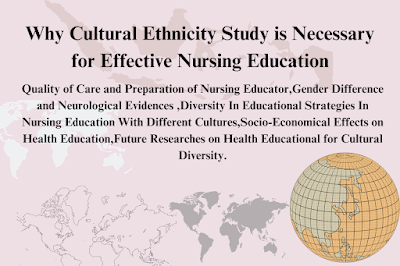Why Cultural Ethnicity Study is Necessary for Effective Nursing Education. Cultural and ethnic studies are fundamental to effective nursing education because they provide nurses with the knowledge, skills, and attitudes necessary to provide culturally sensitive and equitable care to patients of diverse backgrounds.
This leads to improved patient satisfaction and better treatment outcomes. This preparation enables nurses to overcome communication challenges, understand individual needs, and adapt their practice to ensure culturally safe care for all.
Why Cultural Ethnicity Study is Necessary for Effective Nursing Education
For nursing education to be effective, it is essential that nurses base their practice on evidence-based care supported by empirical studies and expert opinions. This foundation allows nurses to deliver the highest quality, scientifically sound care to patients. Moreover, nursing education must prepare future nurses with the most up-to-date knowledge and skills, enabling them to function competently in today’s complex and multicultural healthcare environment.
Preparation of nursing educators is critical for maintaining high standards in nursing care. Educators must be well-versed in the latest evidence-based practices, and they should be equipped to teach a diverse student body. The cultural and ethnic diversity of patients requires nurses to be adaptable, sensitive, and well-prepared to meet the unique needs of various populations. This means understanding the cultural, social, and economic factors that influence health outcomes and integrating this knowledge into nursing education and practice.
Gender Differences and Neurological Evidence
Gender differences in learning and cognitive processing have become an important area of study in recent years. Neuroscience is starting to reveal some of the ways male and female brains are wired differently, which has implications for how individuals think, feel, and respond to educational strategies. Research using brain imaging technology has begun to identify how different parts of the brain are responsible for cognition and emotion and how they interact.
Although brain research is still in its early stages and findings are often conflicting or inconclusive, the insights gained can help refine teaching approaches in nursing education. Gender-specific learning strategies may emerge as a result of these findings, but it’s important not to make premature assumptions or generalizations. Nursing educators should be open to incorporating new evidence into their teaching but remain cautious about overapplying findings until more conclusive evidence is available.
Diversity in Educational Strategies in Nursing Education Across Different Cultures
The increasing cultural diversity within society demands that nursing education embrace diverse educational strategies. In recent years, there has been growing recognition of the need to provide culturally competent care to various groups, including the LGBTQ+ population. As more clients disclose their sexual orientation and gender identity to healthcare providers, nursing education must prepare nurses to meet the healthcare needs of this group with cultural sensitivity and respect.
Educators must include discussions and case studies related to cultural diversity, ensuring that nursing students understand how to approach patient care with an appreciation for different cultural beliefs, values, and practices. Tailoring educational strategies to respect and incorporate the cultural backgrounds of patients will lead to better health outcomes and more equitable healthcare delivery.
Socio-Economic Effects on Health Education
Socio-economic status (SES) is another key factor influencing health outcomes and educational attainment in nursing. SES affects access to healthcare, health literacy, and the ability to adhere to medical recommendations. It is critical for nursing education to address the socio-economic challenges patients face and equip future nurses to recognize and mitigate these barriers to care.
Although research has shown that cognitive abilities are related to health outcomes, the relationship between SES, educational attainment, and health inequalities is not entirely understood. More research is needed to understand how socio-economic factors affect learning preferences and health behaviors, particularly among marginalized populations. Nurses need to be prepared to assess these socio-economic determinants of health and incorporate strategies that account for these disparities in their care plans.
Future Research in Health Education for Cultural Diversity
As the world becomes more multicultural, nursing education must evolve to address the diverse healthcare needs of patients from various ethnic and cultural backgrounds. Future research is crucial to developing reliable and valid instruments for measuring the cultural impact on health beliefs, attitudes, and responses to illness. Understanding the cultural influences on health and illness can guide nursing educators in teaching strategies that account for these variations in patient care.
For example, research should explore how cultural beliefs affect disease prevalence, how different groups respond to health promotion efforts, and how illness prevention and rehabilitation strategies can be adapted to meet the needs of diverse populations. Additionally, exploring gender-specific responses to illness across different cultures can provide further insight into how nursing education can be tailored to better serve diverse communities.
Cultural competency in healthcare is no longer an option but a necessity. Developing new tools and methods to evaluate cultural beliefs and behaviors will help nurses provide more individualized care. This includes further exploration of how different ethnicities perceive health, how they respond to healthcare interventions, and how their cultural background affects their overall health outcomes. These studies can significantly impact how future nurses are trained to handle culturally diverse patient populations.
Conclusion
The necessity of cultural ethnicity in nursing education is evident in the need for nursing educators to be culturally competent, adaptable, and well-prepared to meet the unique needs of diverse populations. Effective nursing education must address gender differences, socio-economic factors, and the growing recognition of the LGBTQ+ community.
Future research should focus on developing reliable tools for understanding the cultural and ethnic impacts on health and illness, ensuring that nurses are equipped to deliver high-quality, culturally sensitive care. By embracing diversity in educational strategies, nursing educators can prepare students to meet the challenges of a multicultural healthcare environment and promote health equity for all patients.
Read More:
https://nurseseducator.com/didactic-and-dialectic-teaching-rationale-for-team-based-learning/
https://nurseseducator.com/high-fidelity-simulation-use-in-nursing-education/
First NCLEX Exam Center In Pakistan From Lahore (Mall of Lahore) to the Global Nursing
Categories of Journals: W, X, Y and Z Category Journal In Nursing Education
AI in Healthcare Content Creation: A Double-Edged Sword and Scary
Social Links:
https://www.facebook.com/nurseseducator/
https://www.instagram.com/nurseseducator/
